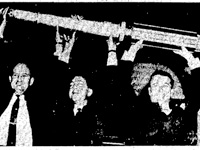John F. Kennedy National Historic Site [MA]
The John F. Kennedy National Historic Site provides public access to the birthplace of John Fitzgerald Kennedy (1917-1963), 35th President of the United States. The home has been restored to its 1917 appearance by Kennedy's mother, Rose Kennedy. Kennedy is the nation's only Catholic President, and the only President to have been awarded a Pulitzer Prize. Events during his administration, cut short by his 1963 assassination, include the Cuban Missile Crisis, Bay of Pigs Invasion, Space Race, Civil Rights Movement, and the building of the Berlin Wall.
The site offers period rooms, 30-minute guided tours, self-guided audio tours, self-guided neighborhood tours, guided neighborhood walking tours, Junior Ranger activities, and teacher workshops. The audio tour consists of the words and memories of Kennedy's mother; and is available in English, French, German, Spanish, and Japanese. Reservations are required for guided neighborhood walking tours. The site is currently inaccessible by wheelchair.
